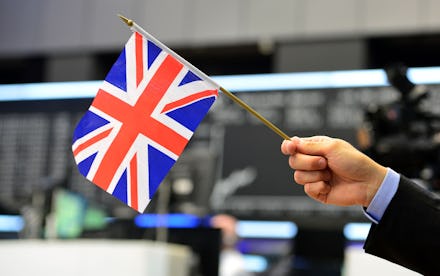Why the Brexit Results Matter for Young People, in One Devastating Chart

The U.K.'s historic decision to divorce itself from the E.U. was a squeaker till the very end — and the Brexit vote clinched its narrow victory with the help of the United Kingdom's oldest residents.
A graph journalist Trancredi Palmeri indicated was created by YouGov reveals the youngest voters in the U.K. were the most supportive of remaining in the E.U., with 64% of 18- to 24-year-olds voting to stay, while only 24% supported the Brexit.
In fact, the chart illustrates how likelihood to support the Brexit correlated, perhaps unsurprisingly, with how old the voter was: The older they were, the more likely they were to support removing the U.K. from the E.U.
While just 39% of voters aged 25 to 49 voted in favor of Brexit, 49% of 50- to 64-year-olds supported the removal. U.K. voters 65 and older voted in favor of leaving the E.U. by 58%, with just 33% of the demographic voting to remain.
As the chart points out — objectively and scathingly — older voters who voted overwhelmingly in favor of leaving will also spend less time on this mortal coil, and will be less impacted by the socioeconomic devastation many analysts have predicted will come in the referendum's wake.
"This vote is also the grimmest of reminders of the power still held by the older generation, not only in the U.K. but around the world," Fusion's Felix Salmon noted, "Young Britons — the multicultural generation which grew up in and of Europe, the people who have only ever known European passports — voted overwhelmingly to remain. They're the generation that just lost its future."
Prime Minister David Cameron, who accidentally consigned that generation to its fate when his attempt to hamper conservative populism in his nation completely backfired, resigned on Friday.
"I was absolutely clear about my belief that Britain is stronger, safer and better off inside the European Union," British Prime Minister David Cameron said Friday, "But the British people have made a very clear decision to take a different path, and as such I think the country requires fresh leadership to take it in this direction."
NPR reported Friday the U.K. removal vote won by just 4%, with 52% of voters supporting the decision and 48% voting to remain. The vote will effectively end the voting bloc's 43-year membership in the E.U., though it could take years of negotiations before the group is officially removed from the union.
For voters, Brexit essentially came down to two things: the economy and immigration debates sparked by the European refugee crisis. "Many communities are fed up with cuts, fed up with economic dislocation and feel very angry at the way they've been betrayed and marginalized," said Jeremy Corbyn, leader of the opposition Labour Party, NPR reported. He added that those who supported the decision for removal "felt that the price of immigration was just too high, that it was driving down wages, costing people jobs."
"With some white Britons there was a feeling also that the immigration was changing the nature of communities here," NPR's Frank Langfitt said.
Read more: